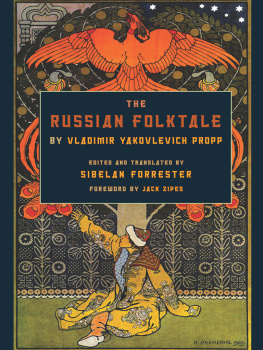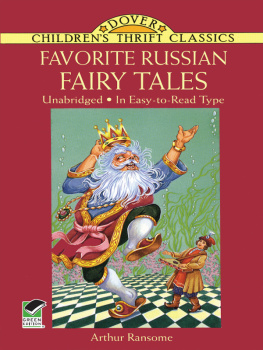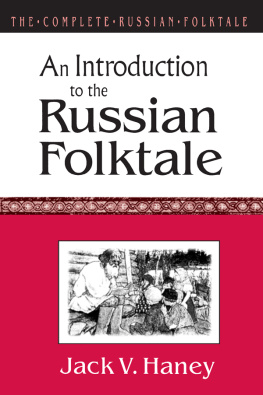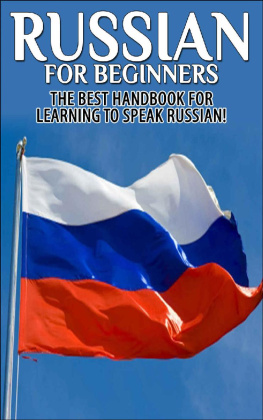SERIES IN FAIRY-TALE STUDIES
General Editor
Donald Haase, Wayne State University
Advisory Editors
Cristina Bacchilega, University of Hawai`i, Mnoa
Stephen Benson, University of East Anglia
Nancy L. Canepa, Dartmouth College
Isabel Cardigos, University of Algarve
Anne E. Duggan, Wayne State University
Janet Langlois, Wayne State University
Ulrich Marzolph, University of Gttingen
Carolina Fernndez Rodrguez, University of Oviedo
John Stephens, Macquarie University
Maria Tatar, Harvard University
Holly Tucker, Vanderbilt University
Jack Zipes, University of Minnesota
A complete listing of the books in this series can be found online at wsupress.wayne.edu
T HE RUSSIAN FOLKTALE
BY VLADIMIR YAKOVLEVICH PROPP
EDITED AND TRANSLATED BY
SIBELAN FORRESTER
FOREWORD BY JACK ZIPES

WAYNE STATE UNIVERSITY PRESS
DETROIT
2012 by Wayne State University Press, Detroit, Michigan 48201. English translation
published by arrangement with the publishing house Labyrinth-MP.
All rights reserved. No part of this book may be reproduced without formal permission.
Manufactured in the United States of America.
Library of Congress Cataloging-in-Publication Data
880-01 Propp, V. IA. (Vladimir IAkovlevich), 18951970, author.
[880-02 Russkaia skazka. English. 2012]
The Russian folktale by Vladimir Yakovlevich Propp / edited and translated by Sibelan Forrester ; foreword by Jack Zipes.
pages ; cm. (Series in fairy-tale studies)
Includes bibliographical references and index.
ISBN 978-0-8143-3466-9 (paperback : alkaline paper) ISBN 978-0-8143-3721-9 (e-book)
1. TalesRussia (Federation)History and criticism. 2. Fairy talesClassification. 3. FolkloreRussia (Federation) I. Forrester, Sibelan E. S. (Sibelan Elizabeth S.), translator, editor. II. Zipes, Jack, 1937, writer of added commentary. III. Title. IV. Series: Series in fairy-tale studies.
GR203.17.P77713 2012
398.20947dc23
2012004220
Published with the assistance of a fund established by Thelma Gray James of Wayne State University for the publication of folklore and English studies.
To N. B., THE EMPERORYOU KNOW WHO YOU ARE.
C ONTENTS
JACK ZIPES
SIBELAN FORRESTER
F OREWORD
TOWARD UNDERSTANDING THE COMPLETE VLADIMIR PROPP
JACK ZIPES
For many years now Vladimir Propp has been famous in the West mainly for his innovative study, Morphology of the Folktale (1928), first published in English in 1958. His other major work, The Historical Roots of the Wonder Tale (1946), was partially translated into English in 1984 in Theory and History of Folklore, a crude pastiche with sundry articles and a misleading introduction by Anatoly Liberman. It was suggestedand Liberman is not the only scholar to have done thisthat Propp had yielded to communist pressure and abandoned his genuine commitment to true scholarship to become a Marxist ideologue when he published Historical Roots. Moreover, other Western scholars spread the same false rumors, arguing that Propps so-called formalist approach to folklore had been considered heretical in the Soviet Union, that Soviet folklorists were all obliged to follow a party line of orthodox historical materialism, and that Propp was largely ignored as a folklorist in the Soviet Union. Nothing could be further from the truth, and thanks to Sibelan Forresters scrupulous and meticulous translation of The Russian Folktale, first published posthumously in 1984, it is now possible to gain a fuller understanding of Propps development as a folklorist and the monumental contributions he made not only to Russian folklore but also to international folklore.
The Russian Folktale is based on lectures that Propp delivered at Leningrad State University in the 1960s and represents the culmination of his thinking about the genesis, relevance, and structure of the Russian folktale. Unfortunately, Propp died in 1970 as he was preparing the lectures for book publication and could not put the finishing touches on them. However, thanks to notes by his former students, his lectures were eventually published as a book and complement Morphology of the Folktale and The Historical Roots of the Wonder Tale, so that we are now in a position to grasp Propps comprehensive approach to folktales and folklore in general.
In his insightful essay, V. Ya. Propp: Legend and Fact (1986), Kirill Chistov, a former student of Propps, clarifies certain myths that had been spread about Russian folklore and Propps status as a folklorist. First, Chistov explains that Propp was never regarded as a formalist in the Soviet Union but rather was considered a structuralist and an innovative folklorist. Without any training in folklore, Propp used a structuralist approach to analyze the Russian wonder tale long before structuralism became fashionable in the West during the 1960s. Second, Chistov demonstrates that Propps Morphology of the Folktale was well received in the Soviet Union when it appeared in 1928 and was discussed and cited by many scholars until and after his death in 1970. In fact, Propp was never censored by the Soviet academy or government. Chistov demonstrates that Propp never abandoned his morphological approach to the folktale, nor was he forced to recant this approach. In contrast, it took the West thirty years to finally recognize the value of Propps approach by bringing out the first translation of Morphology of the Folktale in 1958, when structuralism became popular in Western intellectual circles. Because many Soviet works in folklore had been published between 1930 and 1970, there had never been a linguistic barrier to publishing Morphology of the Folktale, only a lack of favorable conditions in the West. In short, Propp was ignored more in the West than he was in the Soviet Union. Once translated, however, Propps work had a great impact, even though it was pegged as some kind of formalist study. Consequently, Propps early works have never been fully understood in the West even when he endeavored to explain his attachment to history, ethnography, and anthropology in articles and essays.
Th e Russian Folktale, I hope, will rectify some of the misleading impressions of Propps work that various critics have disseminated. As Forrester points out in her preface, Propp intended from the very beginning of his career to work within a historical-anthropological framework; he wanted to include a chapter on the historical origins of the wonder tale in Morphology of the Folktale and would have preferred to use the term wonder tale in the title rather than just folktale. In fact, he could have been even more exact by using the term Russian wonder tale, because his focus in Morphology of the Folktale was primarily on a hundred tales from the huge groundbreaking collection published by the great Russian folklorist Aleksandr Afanasev. The tales selected by Propp from this nineteenth-century collection all belong to the category of wonder tales (Aarne-Thompson-Uther tale types 300749) registered in The Types of International Folktales: A Classification and Bibliography. In other words, there is a an organic development in Propps work on folktales from the 1920s to 1970 that is made eminently clear in The Russian Folktale.
As Propp explains in The Russian Folktale, he believes that in order to establish what constitutes a genre, one has to demonstrate that there is a constant repetition of functions in a large body of tales. The purpose of his
Next page






